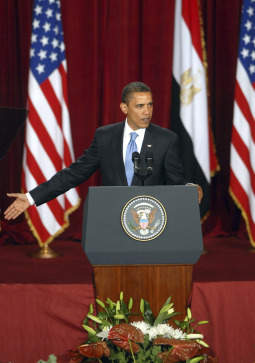Where is Obama on Religious Freedom?
Critics Cite His Support for Islamic Dominance Abroad Over Protection of Christians

WASHINGTON — International religious-freedom advocates are increasingly concerned that the Obama administration has rejected America’s traditional role as the world’s leading protector of religious liberty in order to placate Islamic critics. The concern that the Obama administration is retreating from the nation’s long-standing leadership in advocating for religious freedom in all nations stems from a growing list of actions and inaction in an area that is critical to supporting Christian and other minorities abroad but also in helping to counter violent interpretations of Islam that have inspired thousands of deadly attacks worldwide.
One of the chief symbols and prime drivers of any administration’s commitment to international religious freedom is the ambassador-at-large for international religious freedom, which is a position mandated by the 1998 International Religious Freedom Act. That position sat unfilled until June of this year, when Suzan Johnson Cook was nominated. However, she remains unconfirmed by the Senate more than a year after similar at-large ambassadors for global women’s issues and counterterrorism were nominated and confirmed by the Democrat-majority Senate. Such a delay telegraphs that religious freedom is clearly not an Obama administration priority, said critics, because even a quick confirmation would leave the position filled for only half of Obama’s four-year term.
“It communicates [to foreign-service personnel] that when this person does show up, there is no need to take this position very seriously,” said Thomas Farr, a visiting professor at Georgetown University and senior fellow at the Berkley Center for Religion, Peace and World Affairs there.
Similarly concerning is the move by the Obama administration away from previous presidents’ references to “freedom of religion” to “freedom of worship.” The seemingly innocuous change in wording is noticed by State Department staff, who have many competing priorities, and by foreign nations who are hostile to religious freedom, according to advocates.
Change in Language
The language change was specifically cited by the 11th annual report by the U.S. Commission on International Religious Freedom, a congressionally mandated watchdog, that said holding other nations to a “freedom of worship” standard allows them to claim they are not oppressing certain religions if they allow the practice of those religions within the walls of their churches, temples or synagogues — even as they crush its display outside of those settings.
“It tells someone overseas … that we’re not really going to hold you to account if you are persecuting someone outside of a house of worship,” said Eric Rassbach, national litigation director at the Becket Fund for Religious Liberty.
Specifically, such nations may allow minority churches but authorize those believers to be literally “gunned down with impunity leaving [those] places of worship,” said Leonard Leo, chairman of the U.S. Commission on International Religious Freedom, when it released its report.
Evan Owen, a State Department spokesman, countered that “freedom of religion” has been referenced by the administration on at least two important occasions: during Obama’s speech in Cairo in June 2009, when he said “freedom of religion is central to the ability of peoples to live together,” and by Secretary of State Hillary Clinton when releasing the department’s 2009 International Religious Freedom report, which evaluates the situation in each country of the world.
“On an everyday basis, our ambassadors and senior officials routinely raise religious-freedom issues in meeting with host-nation governments, civil society and the media,” Owen said.
Beyond the words, religious-freedom advocates have seen little action by this administration to push Islamic nations hostile toward the United States or even U.S.-allied Muslim nations toward better treatment of their minority religious populations. Rep. Trent Franks, R-Ariz., co-chairman of the International Religious Freedom Caucus, said the administration’s lack of action to address the ongoing expulsions of Christians from Iraq and other Islamic countries highlights its general disinterest in the issue.
“There is a general malaise” on religious freedom in the Obama administration, Franks said. “But it’s actually the cornerstone of all freedoms.”
Undermining Pro-Life Law?
Beyond the weak responses to religious persecution in other countries, the Obama administration has been accused of actively undermining religion-based pro-life laws in Kenya, where it helped drive ratification of a constitution this year that for the first time allowed for abortion in cases other than when the life of the mother was in danger. Federal law prohibits using U.S. foreign assistance to lobby for or against abortion.
Rep. Chris Smith, R-N.J., has spurred an ongoing investigation into the Obama administration’s role in the Kenyan constitution ratification by the inspector general of the U.S. Agency for International Development, and he plans hearings on the issue if Republicans gain a majority in the House of Representatives after the Nov. 2 election.
“The new constitution, in failing to protect Kenya’s children, does not bode well for Kenya’s future,” Smith said. “It is doubly tragic that the Obama administration illegally used U.S. taxpayer dollars to do it.”
Another issue raised by the Kenyan constitution was its elevation of Islamic “kadhi courts” and the provision of state funding to them. Leaders of other religious groups in Kenya are concerned, Smith said, that granting privileges to one religion over others in the constitution will lay the foundation for state-sanctioned religious discrimination.
Such active accommodations of hard-line Islamist belief are part of an emerging pattern in the Obama administration, according to William Murray, chairman of the Religious Freedom Coalition, and others.
“The pandering to Islam causes a lack of religious freedom for all other faiths,” said Murray, citing a lack of an Obama administration response to forced Islamic marriages of Hindi women in Bangladesh and repeated Islamic massacres of Indonesian Christian civilians.
Like other religious-freedom advocates, Murray granted that outspoken U.S. condemnation of such atrocities could precipitate more attacks on religious minorities in majority-Islamic countries, but at least in some of those countries U.S. military forces are available to provide sanctuary and protection, if political leaders allow them to do that.
Rich Daly writes from Washington.













